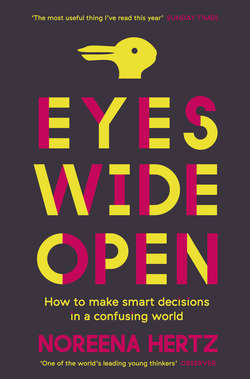Читать книгу Eyes Wide Open: How to Make Smart Decisions in a Confusing World - Noreena Hertz - Страница 21
Glass Half Full
ОглавлениеSo we need to be careful about focusing excessively on numbers, or on things in bold typeface, or on the information that others deem most relevant for us, or that glitters most brightly. We also need to start paying more attention to people’s stories and testimonies, even if they cannot be quantified.
Beyond this, there’s another type of information we should watch out for that is prone to draw us in – information we want to hear, over information we don’t.
Neuroscientist Tali Sharot explored this theme by putting volunteers in a brain scanner and asking them what they believed the chances were of various unpleasant events occurring to them in their lifetime. She asked questions like how likely are you to get burgled? How likely are you to contract genital warts? How likely are you to develop Parkinson’s disease? That sort of thing.29
After each answer, she immediately told her volunteers what the real chances were of such an event happening. So, if someone thought they had a 10 per cent chance of developing cancer, she would reveal that the real probability was 30 per cent – or quite a lot worse.
What Sharot discovered was that when her subjects were given bad news, news that should have led them to be more concerned than they were previously, the part of their brains that should have fixed the mismatch between their prediction and the true chance of disaster showed only low-level activation.
However, when a subject was given information that was better than expected – for example, if someone thought they had a 50 per cent of being burgled, but was then told that their real chance of being burgled was only 30 per cent – the part of their brain that processed the information went wild. What’s more, when the volunteers were asked to go through the list of unpleasant events again, they actively changed their beliefs when the information they had been given improved their prospects. For example, if they found out that they were actually less likely to suffer from infertility than they had thought, they adjusted to the new risk percentages presented. But if the new information pointed to there being an even higher chance of something bad happening to them, they simply ignored it.
When it comes to things that affect us directly, it seems that many of us dismiss information that suggests that bad things will happen to us, and only pay attention to the good stuff. It doesn’t matter what we throw at them, unconscious processes in our brains are determined to show us a rosy glow.
There are obvious dangers to this when it comes to making decisions. If your unconscious belief is that you won’t get lung cancer from smoking, then you’re unlikely to choose to quit. For every warning from an anti-smoking campaigner, your brain will be giving a lot more weight to that story of the ninety-nine-year-old lady who smokes fifty cigarettes a day but is still going strong. You’re not doing this consciously, but it is happening.
Similarly, if you’re a trader buying and selling stocks and shares, or an investor looking to buy another property, you’ll be paying more attention to evidence of sustained growth and stories of rising prices than to the nay-sayers who predict a crash – a partial explanation for financial and housing bubbles.30
The inability to properly process news that suggests something bad may happen to us is clearly a dangerous trait for nearly all decision-makers – not just traders or smokers or property speculators. Dr Sharot’s research reveals that 80 per cent of us are very vulnerable to this mental lapse.31 Interestingly, however, there is one group of people who it turns out update their beliefs in a more balanced way: people with mild depression appear to be better at balancing the good and the bad when they receive information.
If you’re not depressed yourself, however, don’t despair. Being aware that you’re prone to this thinking error is a start – it means you can challenge your immediate reactions and reflect upon how your decisions would be affected if your optimism were overstated. You might also, now that you are cognisant of your ability to trip yourself up, want to take out insurance against the worst happening. As Sharot advises, do carry an umbrella even if you’re sure the sun will shine, and do buy health insurance even if you’re certain nothing bad could ever happen on you.32
